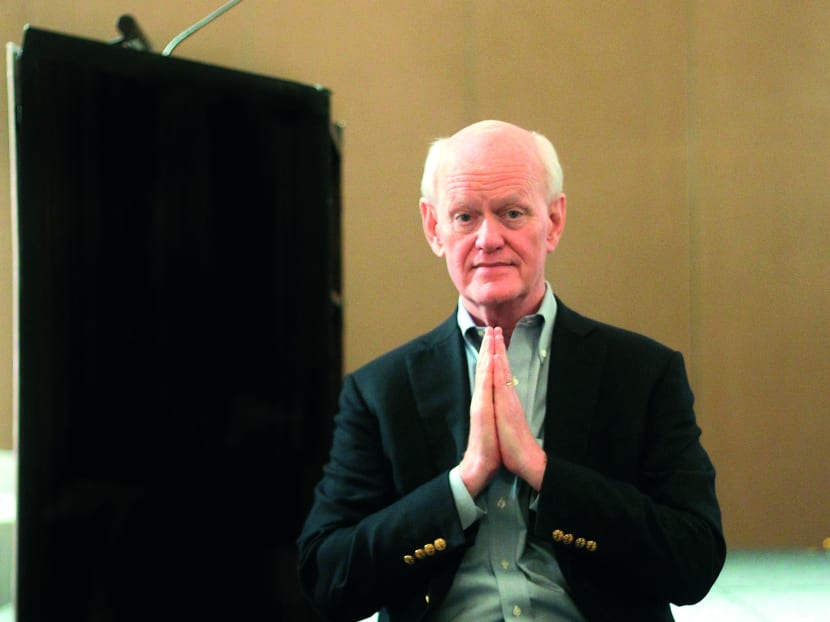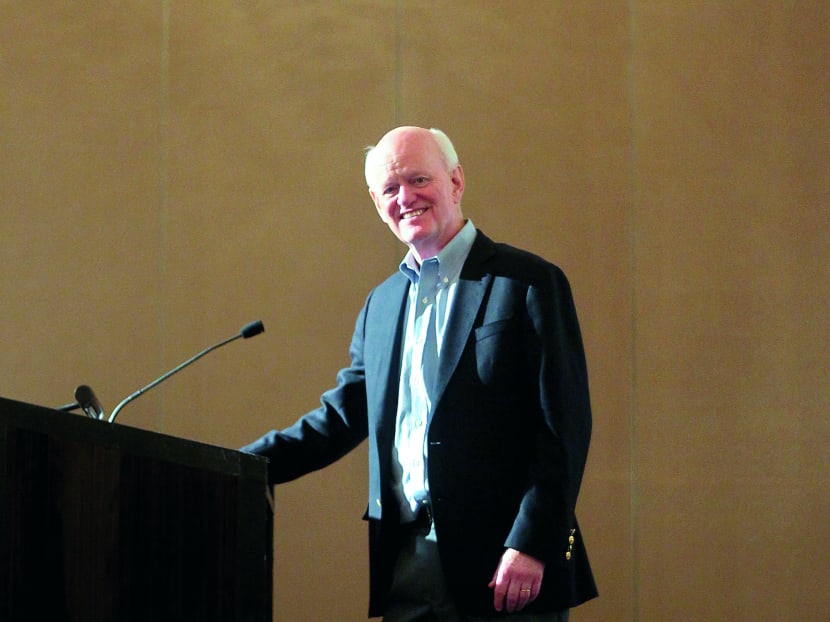A 360° Guru
His current client roster alone is impressive: World Bank President Jim Yong Kim, Pfizer CEO Ian Read and chef David Chang of the famed Momofuku group of restaurants, to name a few.


His current client roster alone is impressive: World Bank President Jim Yong Kim, Pfizer CEO Ian Read and chef David Chang of the famed Momofuku group of restaurants, to name a few.
What’s perhaps even more so, is how renowned executive coach Marshall Goldsmith marshalls such titans for a super-powered “support group” over dinner, where they discuss their problems and trade advice.
“You have 20 CEOs with two case studies, Dr Jim is talking about changing the World Bank. (CEO Joly) Hubert is talking about changing Best Buy. It’s kind of like Harvard Business School, only about 100 times better because it’s real. These are real people, dealing with real issues involving billions of dollars. It’s fun,” says Mr Goldsmith breezily over lunch at The St Regis Singapore, where he has just given a talk on becoming a better leader, his key area of expertise.
The avuncular Mr Goldsmith, 64 — who was ranked among the top leadership thinkers in the world in the Thinkers50 ranking sponsored by Harvard Business Review in 2011 — seeks to keep these sessions “not too formal”, with no more than 20 attendees.
“Almost everyone has said when they left, ‘I feel so much better because I thought my problems were unique, and then I meet all these other people, I realise they are so similar to me’. Because they have no one to talk to. You can’t talk to your peers, you can’t talk to your boss about everything. Well (now) they have another person who’s in a multi-million dollar company and they’re not competitors and they can talk. It’s nice.”
YOU CAN’T SAVE EVERYONE
Although a significant part of Mr Goldsmith’s work involves speaking at seminars and workshops, executive coaching is what he is best known for, along with his “360-degree” feedback model, which involves collecting confidential feedback from peers and managers of his client, coming up with a set of measures and behavioural changes for the client to agree to.
Mr Goldsmith, who coaches about 10 clients at any given time for 18 months, says the secret to his success is to “have the world’s greatest customers”.
“I really focus on working with great people who are dedicated and want to be better,” says Mr Goldsmith, who does not charge clients if the behavioural goals are not met. “I don’t get paid if they don’t get better ... If they’re not interested or motivated, I just don’t work with them.”
These days, Mr Goldsmith almost always gets paid but this was not the case in his younger days. “If I didn’t get paid the problem was almost always my fault: My ego. I thought I could save people,” he says.
He now operates on a simple philosophy: “Before I deal with any topic, I breathe and ask myself a question: Am I willing, at this time, to make the investment required to make a positive difference? If the answer is no” — he exhales, to make his point — “let it go. I only try to deal with things I can make a difference to.”
FROM HIPPIE TO BUDDHIST
His latest book — he has published more than 30 — echoes this sentiment. It is inspired by Hinduism and influenced by Buddhism, says Mr Goldsmith, a self-described “philosophical Buddhist”.
Life, he explains, consists of creating, preserving, eliminating or accepting — which is represented by the Hindu gods Brahma, Vishnu and Shiva, as well as Buddha.
“So my new book is about how we determine what we want to create, accept, preserve and eliminate. As we wander through life we have these constant challenges and it’s hard to become the person we want to become because we are surrounded by all constant temptations and distractions.”
For the self-confessed former “communist hippie” who once hitchhiked more than 10,000 miles across the United States (he went from New York to Kentucky to California on his own at age 18), Buddhism has strongly influenced his philosophy on leadership.
“I teach something called “feed-forward”, (where) you learn to ask for ideas for the future rather than the past. It’s a very Buddhist idea, you learn to listen to ideas and thank them and not judge them,” he says.
PITFALLS OF INTELLIGENCE
Successful, powerful people are sometimes out of touch, but this is not always entirely their fault, he points out.
“What happens is that the more power we have, the harder it is for people to tell you the truth ... And the better I feel about myself, the harder it is for me to recognise I’m wrong, especially when everyone around me kowtows and pretends I’m perfect.”
Intelligent people face similar challenges. “If a person is very intelligent he understands things very quickly, he assumes everyone else understands things as quickly, when they don’t,” he says. “The other problem with very bright people is that others are often afraid to express different opinions because they don’t want to look stupid.”
Even people of integrity get trapped in the “bubble” of success.
“If you have high integrity I am less likely to challenge you, because I think, ‘Well she’s doing things for the right reasons, it must be me’.”
The challenge is for successful people to work harder to create the right environment for people to express their opinions so that they can learn, and “don’t get lost in the bubble”, he adds.
CIVIL SERVICE EGOS
He is no stranger to Singapore, having held talks for companies and government agencies here over the years.
The government employees here, he observes, are “quite different” from the ones in the US.
“They get paid more, they’re highly educated, and they have bigger egos, bigger than any government employees I’ve met anywhere else in the world. It’s not good or bad, but they consider themselves superior to almost any government employee in the world,” he says with a laugh.
To keep his own behaviour in check, every day Mr Goldsmith has someone pose 32 questions he wrote to him and he answers.
“They include things like ‘Did I do my best to be happy’, ‘Did I do my best to find meaning’, ‘Did I do my best to be positively engaged’, ‘Did I do my best to build relationships’, ‘Did I do my best to set clear goals’, ‘Did I say something nice or positive to my wife, my son or my daughter, how many minutes did I walk ... stuff like that.”
Understanding one’s behaviour and making positive changes are hard, he says. “(My lifestyle), that’s an excuse to be an alcoholic, that’s an excuse to be divorced, an excuse to kill yourself,” he says.
GROWING UP POOR, IN THE WORST SCHOOL
Mr Goldsmith grew up an only child in Valley Station, Kentucky.
“The junior high school down from my street, last year, out of 319 schools, we were ranked last place (in academic achievement). Kentucky is near the bottom in academic achievement in the US, and we were in last place in Kentucky.”
He credits his mother for his success in getting out and going on to college, and eventually earning a PhD in organisational behaviour from UCLA’s Anderson School of Management.
“My mother went to college for two years and was a teacher. My father thought women shouldn’t work, so we got to live in poverty, but the good news was that all of her energy was devoted to me. I knew how to add, subtract and multiply before I was in school. I was always brought up to believe I could do better.”
Now married and a father of two grown children, with homes in New York City and in Rancho Santa Fe in California, Mr Goldsmith’s life is vastly transformed — he proudly whips out an American Airlines frequent flier card that states he’s chalked up 11 million miles.
He hopes to return to Valley Station to “do some good deeds and help the local community”.
“I’m going to hopefully get 10 students, and try and help them. Be their coach. Give them advice. I have a lot of contacts. Help them get jobs. Help them get a good life,” he says.
“(They need) hope and support ... They need to believe they can advance, it’s not hopeless. It’s hard when you are at the bottom.”
About 40 per cent of his work is done for free, such as for non-profits like the Nature Conservancy and the World Bank, as well as USAID. “In a way, I help to do good by helping people who do good be better,” he says.
He owes his start in the management speaking circuit to behavioural scientist Paul Hersey, whom he assisted when he was a professor at Loyola Marymount University.
On one occasion, when Dr Hersey was double-booked for speaking engagements, he asked Mr Goldsmith to step in. “He said, ‘Look, I will pay you US$1,000 (S$1,252) for one day if you can do this. That was 36 years ago, I was 28 years old … that was a huge amount of money. I said, ‘I will try’ …
“That’s how I got into this business. A lot of life is luck.”






